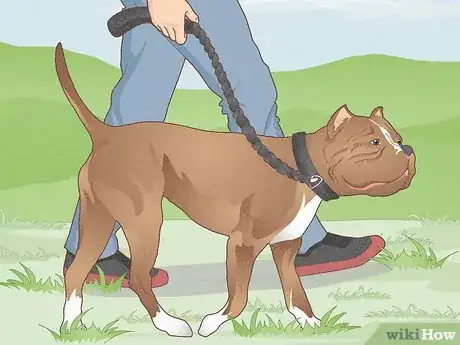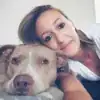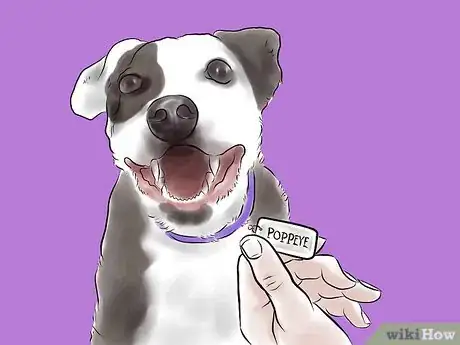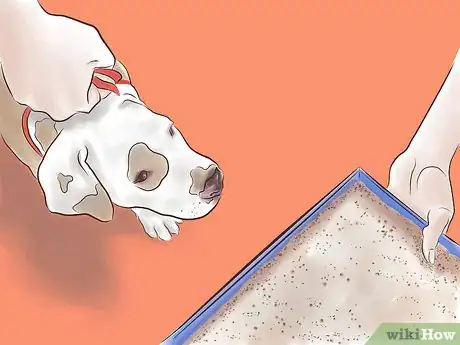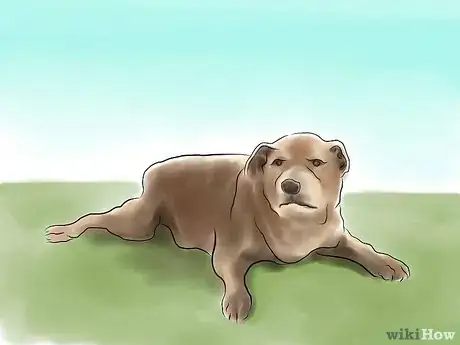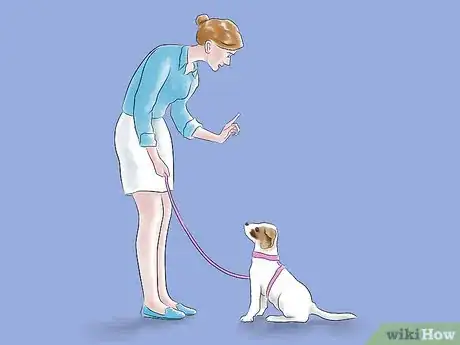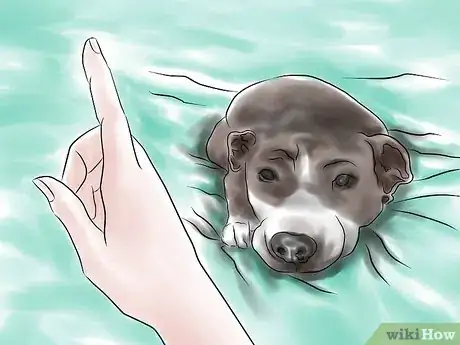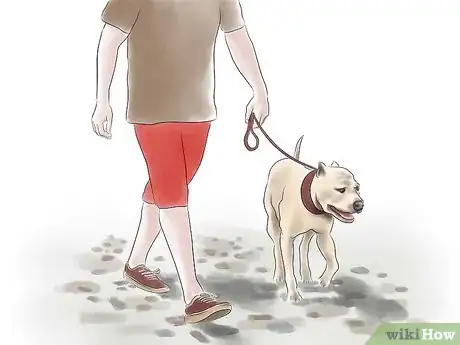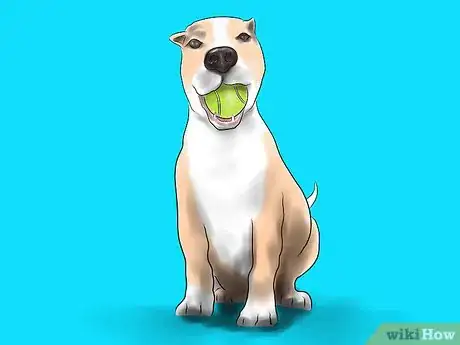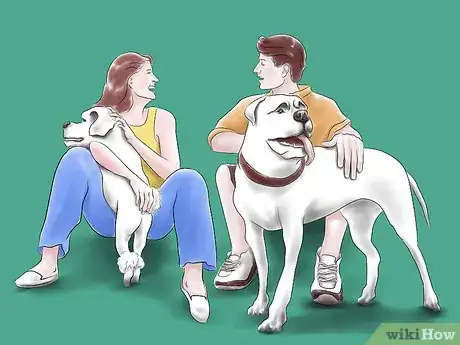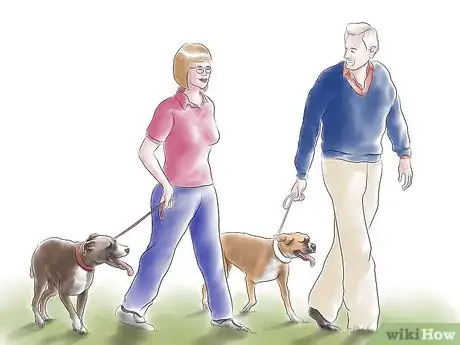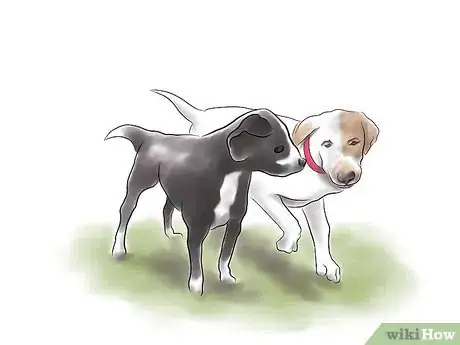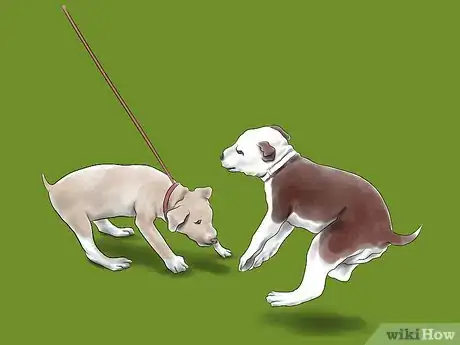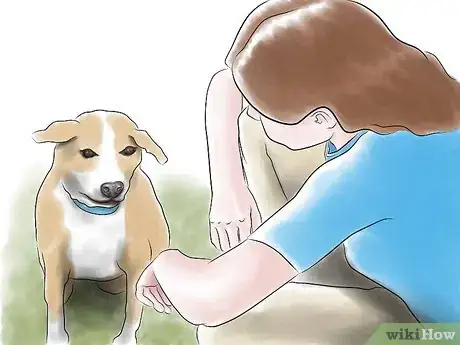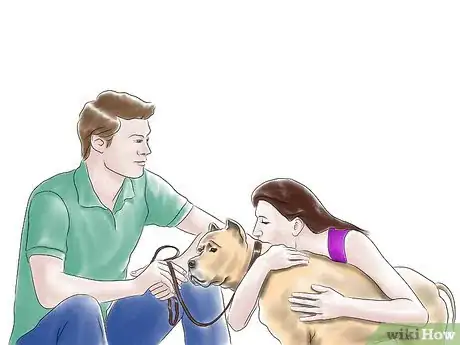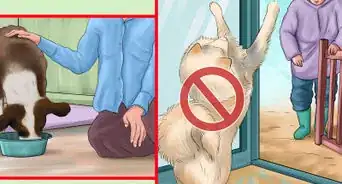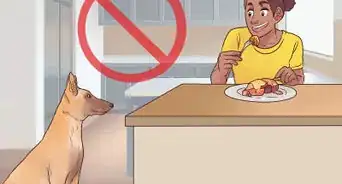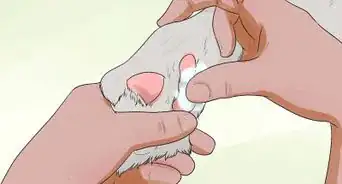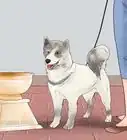This article was co-authored by Jessica Powell. Jessica is a Certified Professional Dog Trainer and the Owner of Proud Paws Dog Training, a small business offering private coaching and in-home dog training services to dog parents across the San Fernando Valley of Los Angeles, California. With nearly ten years of experience, she has extensive knowledge and experience in dog behavior, effective communication techniques, animal welfare, manners training, behavioral modification, and enrichment. Jessica holds a Bachelor of Science degree in Animal Management and is also an experienced shelter professional.
There are 9 references cited in this article, which can be found at the bottom of the page.
wikiHow marks an article as reader-approved once it receives enough positive feedback. This article received 29 testimonials and 82% of readers who voted found it helpful, earning it our reader-approved status.
This article has been viewed 824,668 times.
Pit bulls have gotten a bad reputation for being too aggressive, but a well trained pit bull can be a sweet and loyal companion. Training any dog is important for his own well-being, but because of the misinformed media coverage of this breed, pit bulls have to be great breed ambassadors. If you want to know how to train your pitbull and to give pit bulls the good name they deserve, just follow these steps.
Steps
Caring for Your Pit Bull
-
1Give your pit bull lots of exercise.[1] If your pit bull is feeling cooped up or has too much energy, he or she might get aggressive. Take your pit bull on lots of walks if you don't have a big backyard to run around in. You should be prepared to spend at least two hours day with your pit bull to give him the exercise and attention he needs.[2] Or, if you need to, you should get out yourself and go to a dog park along with your furry friend.[3]
- Walk your pit bull as often as necessary and take the time to clean up the dog's mess. A well-exercised dog is a happy dog.
-
2Use a crate. Pit bulls, like other dogs, like having their own small area that belongs to them. The crate should never be used as a punishment, but rather as a place for pit bulls to sleep or to go to if they are feeling overwhelmed.[4]Advertisement
-
3Give your dog a collar and tags. Put a collar and tags on your new pit bull so that you can find him when he gets lost. You should also get a microchip for your dog so he can easily be found if all else fails. Many pit bulls that are lost suffer because it is difficult to place them into homes with new families. Take the short time to properly care for your pet and you'll make a big difference in his well-being.
-
4House-train your pit bull. If your pit bull is a puppy, he will have to urinate often. He'll need to use the toilet during several occasions: after he eats, after a long car ride, when he wakes up from a deep sleep, and after exercise. He'll need to go every few hours throughout the day, though by six months, he should be able to go a night without using the restroom.[5] Here's how you can house-train your pit bull:
- Before you get your puppy, pick a toilet area outside your home that will be his go-to spot.
- As soon as he gets home, take him to this area until he uses the bathroom.
- Praise him for doing his business.
- Look for signs that he needs to use the restroom and lead him to the area when he shows them. He may be scratching or sniffing the floor, walking in small circles, or generally looking agitated.
-
5Learn to read your dog's body language. Just like people, pit bulls are all different creatures with different fears and needs, and they have different body language that can show when they are upset or agitated.[6] As you get to know your pit bull, look out for signs that show that he's upset. If he starts growling, barking, pacing in circles, or generally looks angry, then it's time to see what you can do to change the situation. Get to know your own little creature and look out for signs that he's too excited, upset, or even tired.[7]
- Some signs that your dog is uncomfortable around another dog or creature include a stiff posture, curled lip, growling, air snapping, tucking his tail between his legs, or even trying to hide behind you.
- If your dog freezes, he also feels uncomfortable and his guard is up.
- Find what you need to do to calm your dog down when he exhibits these behaviors, whether it's to move him away, give him a treat, praise him, take him for a walk, or to find a combination of these behaviors.
Disciplining Your Pit Bull
-
1Use positive reinforcement.[8] When you train your pit bull, focus on teaching him rather than the result. It will take him some time to catch on to your training. Give your dog a simple command when he's ready, and if he follows your orders, then reward him with praise or his favorite treat.[9] Rewarding him with positive reinforcement instead of punishing him when something goes wrong is the way to earn his trust on to tame his aggression.[10]
- When you use positive reinforcement, be consistent. Just as you would discipline a child, if your dog does something right, you should reward him every time (even if it's just by petting him and giving him kind words), or he will get confused by your mixed signals.
- Always be firm. Don't give in, even if your dog looks particularly cute. This will only cause him to be more confused -- and more likely to act up in the future.
-
2Establish dominance. Your dog should realize that you are the leader and that the dog must obey you. Pit bulls need a leader or they will try to become the dominant, alpha dog. Here are some ways to establish dominance over your dog while keeping his loyalty and respect. To show the dog that you are the leader of the pack your should be able to both give him permission to do the things he wants to do, and deny him permission to do the things he shouldn't.
- Give your dog praise so he knows that you own him. Give him this praise quickly but don't drag out the praise.
- If your pit bull does something wrong, quickly correct him without dragging it out. Dogs have a memory attention span of 5 seconds; they live in the now moment.
- Give and deny your pit bull permission to do things like eat, jump on the bed, or go outside. You do this to demonstrate your dominance.
- When entering the house, your dog should follow you, allowing you to go first.
- Your pit bull should obey you on your first command if you have established dominance.
-
3Leash train your dog.[11] Train your pit bull to obey you even when the leash is loose rather than pulled tight. This allows your dog to have the freedom to explore and go to the bathroom, but the dog is still within your reach. Using the leash with your dog, especially when you're outdoors, will keep him from getting out of control.[12] Here are some other things to keep in mind as you leash train your dog:
- To train, the dog must learn that the leash should be slack at all times. If he puts tension in the leash, turn around and pull him the opposite direction. This will teach him to follow you and to not try to lead the way.
- If your dog is keeping the leash slack, praise him or give him a treat so he knows he's doing what he is supposed to.
-
4Stop biting before it starts. If you want your pit bull to know that it's wrong to bite people, then you have to start when he's small. Sure, his nips may be cute when he's just a tiny pup, but his bites will have serious consequences when he's all grown up. Whenever he bites you, move your hand and cry out like you're in pain; this will trigger an alarm bell in your dog's head and will let him know that something is wrong.
- Another way to prevent your pit bull from biting is to have lots of chew toys for him. This will channel his aggression in a playful and productive way. If he has no toys to bite, he's more likely to aim for your body.[13]
Socializing Your Pit Bull
-
1Start socializing your pit bull when he's young. Perhaps the most important part of training any dog, but especially pit bulls, is socialization.[14] Start when your dog is a puppy for the best results, but a dog of any age can be socialized. Take your pit bull out so it can interact with other dogs and people. This will keep your dog friendly, as it will be used to other animals.[15]
- Many people recommend that you enroll your puppy pit bull in a puppy training class after he reaches six months. The right class can help him get accustomed to other dogs and to learn how to behave.
-
2Introduce your pit bull to other dogs.[16] Some pit bulls will simply not ever get along with other dogs, while others may be very friendly. It's important to know your dog's personality and to avoid forcing him to socialize with other dogs.[17] But if you do think he's ready and willing to meet other dogs, try the following:
- Introduce the dogs by walking them in a parallel direction with their leashes on, choosing a neutral territory so neither of them gets territorial.
- Continue to walk the dogs a few feet apart, alternating between which dog is in the lead.
- Don't let your dog run up to other dogs if he gets excited -- you're in control of his socializing.
- If both dogs still have their leashes, make sure not to tangle them, or this can cause a fight.
-
3Let your pit bull sniff other dogs if the introductions go well. If the initial introduction worked well and the dogs seemed to get along, let them briefly sniff each other while standing perpendicularly to each other so that they still don't see each other head on. If either dog stiffens or stands up on his toes, pull the dogs apart before anything goes wrong.
- You may have to take many walks before you can go past the introduction stage.
-
4Let your dog play in an enclosed off-leash area of all goes well. If sniffing goes well, let your dog hang out in a fenced area with another dog. Let the dogs play with one dog on a leash and the other off the leash. The newer dog should be leashed and the fenced area shouldn't have too many items that can cause a fight, like bones or exciting toys. If the dogs are comfortable in this environment, take off their leashes and make sure that each owner stays near the dog to keep him in line.
- Make sure to keep the dogs in an enclosed area throughout the encounter.
- Keep around a squirt bottle to use on your dog in case things get out of line.
- Don't let two pit bulls play together without full supervision. You never know what can happen.
-
5Know what to do if your dog gets too excited in off-leash situations. If your dog gets too excited around other dogs in off-leash situations, you should be able to pull him away before the excitement starts. Let's say you notice that it takes about 20 minutes for your dog to get too excited around other dogs. If that's the case, then pull him away after 10 or 15 minutes to avoid a conflict.
- And if your dog is always excited around other dogs in an off-leash situation, or just has proven not to enjoy the company of other dogs, it's better to let him have his space than to force him to spend time with other dogs when he doesn't enjoy it.
-
6Socialize your pit bull with children when he's ready. Your pit bull should trust you and should be trained and comfortable with following directions before you introduce him a child. If you introduce him to a child too early, he may indeed attack him. Therefore, wait to introduce him to children until you're confident that he knows right from wrong.
- Pit bulls are actually known for loving children -- don't think that all pit bulls are mean to little kids.
- Unfortunately, if you spend a lot of time with children and can't get your pit bull ready to get along with them, then you will have to find a new owner.
-
7Socialize your pit bull with strangers. If you want your pit bull to be able to get along with strangers, he has to earn your trust first. After that, if you invite strangers into your home, you need to tell them how to act to avoid upsetting your dog. The strangers should not approach the dog, touch the dog, or make eye contact with the dog. Instead, they should walk in slowly, and, in a sense, "ignore" the dog, which will give him time to smell them, to touch them, and to get used to their presence.
- Once the dog is comfortable with the stranger, then they can slowly try to get closer to him.
Expert Q&A
Did you know you can get expert answers for this article?
Unlock expert answers by supporting wikiHow
-
QuestionDo Pit Bulls need special training?
 Osama MaghawriOsama Maghawri is a Dog Trainer and Founder of OneStopK9, a dog training service in Miami, Florida. Osama utilizes balanced training methods to teach communication between owners and dogs. He specializes in basic obedience and behavioral issues such as resource guarding, fear-based aggression, and leash reactivity. Osama also helps owners understand the behaviors of their breed and how to continue training on their own in the future.
Osama MaghawriOsama Maghawri is a Dog Trainer and Founder of OneStopK9, a dog training service in Miami, Florida. Osama utilizes balanced training methods to teach communication between owners and dogs. He specializes in basic obedience and behavioral issues such as resource guarding, fear-based aggression, and leash reactivity. Osama also helps owners understand the behaviors of their breed and how to continue training on their own in the future.
Professional Dog Trainer All dogs are susceptible to the same forms of aggression. A Pit Bull is not naturally more aggressive. Due to their strength, however, they can do a lot more harm than most other breeds. You want to start building their confidence and teaching them to be neutral around people and dogs. To do that, take them outside often. Every time you see something that they're afraid of, encourage them to approach it and reward them when they do. Teach them to work through their stress and overcome that obstacle.
All dogs are susceptible to the same forms of aggression. A Pit Bull is not naturally more aggressive. Due to their strength, however, they can do a lot more harm than most other breeds. You want to start building their confidence and teaching them to be neutral around people and dogs. To do that, take them outside often. Every time you see something that they're afraid of, encourage them to approach it and reward them when they do. Teach them to work through their stress and overcome that obstacle. -
QuestionHow do I keep my pit from jumping on anyone inside or outside of the house?
 Community AnswerYou should train your dog to "sit and stay" when someone is entering the home. If you are expecting company, walk to the door with your dog when they arrive and continually remind her to "sit, stay, good girl." Once the company enters, keep enforcing "sit, stay," and if she tries jumping, say "down," guide her back to her sitting position, and continue saying "sit." It's hard to control an excited dog, but if you remain consistent they will learn. Also, have your company greet the dog once they have calmed down and listened to your commands. It's almost a "reward."
Community AnswerYou should train your dog to "sit and stay" when someone is entering the home. If you are expecting company, walk to the door with your dog when they arrive and continually remind her to "sit, stay, good girl." Once the company enters, keep enforcing "sit, stay," and if she tries jumping, say "down," guide her back to her sitting position, and continue saying "sit." It's hard to control an excited dog, but if you remain consistent they will learn. Also, have your company greet the dog once they have calmed down and listened to your commands. It's almost a "reward." -
QuestionHow can I know my pit bull dog is not in a good mood?
 Community AnswerWhen your pit isn't in a great mood, it will show it. When is is sad, it will look sad. Pits are human like in behavior and if you pay enough attention, you will know. They're very easy to read, and after spending enough time with your dog, it will be like mother and child, you will just know. If you feel like something is wrong with your pit, trust your instincts. Your pit is loyal to you and will let you know if it needs you to know something.
Community AnswerWhen your pit isn't in a great mood, it will show it. When is is sad, it will look sad. Pits are human like in behavior and if you pay enough attention, you will know. They're very easy to read, and after spending enough time with your dog, it will be like mother and child, you will just know. If you feel like something is wrong with your pit, trust your instincts. Your pit is loyal to you and will let you know if it needs you to know something.
Things You'll Need
- 15 feet (4.6 m) lead or shorter, you want it long to teach the come and stay commands. We call it recall
- Treats for positive reinforcements
- Your dogs favorite toy
- Patience
- Calm assertive attitude
References
- ↑ Jessica Powell. Certified Professional Dog Trainer. Expert Interview. 5 October 2021.
- ↑ Osama Maghawri. Professional Dog Trainer. Expert Interview. 9 September 2020.
- ↑ https://dogtime.com/dog-breeds/american-pit-bull-terrier#/slide/2
- ↑ Jessica Powell. Certified Professional Dog Trainer. Expert Interview. 5 October 2021.
- ↑ https://www.akc.org/expert-advice/training/how-to-potty-train-a-puppy/
- ↑ Osama Maghawri. Professional Dog Trainer. Expert Interview. 9 September 2020.
- ↑ https://www.aspcapro.org/resource/7-tips-canine-body-language
- ↑ Jessica Powell. Certified Professional Dog Trainer. Expert Interview. 5 October 2021.
- ↑ Osama Maghawri. Professional Dog Trainer. Expert Interview. 9 September 2020.
- ↑ https://moderndogmagazine.com/articles/importance-positivity/52197
- ↑ Jessica Powell. Certified Professional Dog Trainer. Expert Interview. 5 October 2021.
- ↑ https://moderndogmagazine.com/articles/five-quick-tips-stop-your-dog-pulling-leash/20193
- ↑ Jessica Powell. Certified Professional Dog Trainer. Expert Interview. 5 October 2021.
- ↑ Osama Maghawri. Professional Dog Trainer. Expert Interview. 9 September 2020.
- ↑ https://moderndogmagazine.com/articles/10-socialization-training-games-you-should-play-your-puppy/119978
- ↑ Osama Maghawri. Professional Dog Trainer. Expert Interview. 9 September 2020.
- ↑ https://moderndogmagazine.com/articles/10-socialization-training-games-you-should-play-your-puppy/119978
About This Article
To train a pit bull, start introducing it to new people at a young age so that it will be friendly. When it is around 6 months old, enroll in an obedience class to socialize it with other dogs. When strangers enter your home, have them ignore your dog until it approaches and wants to be petted. When teaching your dog commands, use positive reinforcement to reward good behavior and be sure to avoid yelling at or hitting your dog because fear can make dogs aggressive. To learn how to socialize your pit bull with other dogs, keep reading.
